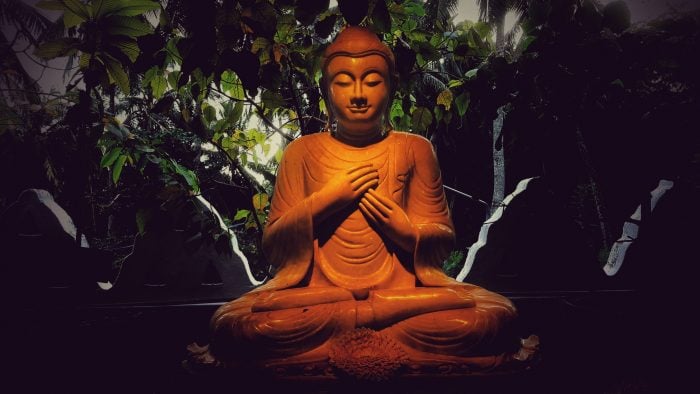“Thoughts in the mind are like waves in the ocean: you can never fully stop them from arising.” ~ Zen master Shunryu Suzuki
I was born in a South Indian, Hindu family from Kerala.
My family has never been deeply religious or dabbling in meditation and philosophies.
Intellectually, the feeling has been good. It’s straightforward and staring into reality mode most of the time. That said, when I discovered the Buddhist teachings, the feeling was rejuvenating and kind of entertaining.
About three years ago, I started buying books on Zen and Buddhism, straining my eyes, heart, and mind, and searching for demonstrable results.
Soon enough, I realized that Buddhism is a vast ocean. I read Zen mind, Beginners Mind by renowned Zen monk and teacher Shunryū Suzuki. It was the first book I ever read on Zen Buddhism, and I found it to be simply enlightening. Suzuki teaches us how to walk the simple path of cultivating a calm mind through meditation.
I also subscribed to the magazine “Lion’s Roar” and read their articles that tackle Buddhism. I saved screenshots, and many of the quotes that I found there made their way into my journals. To this day, I find great relief in the many pocket-classics that I own.
I simply wanted to read, understand, and take a plunge into the Buddhist wisdom. I read everything although I didn’t understand all of it, but I tried my best to grasp their essence.
Meditating, fasting, practicing yoga, and experiencing all kinds of strange and wonderful states of mind was beyond great.
Here’s how Buddhism has helped me:
Importance of self-love.
I usually spend hours for weeks by myself, amusing my two lovely young boys. Although I greatly look forward to that time every week, Buddhism has taught me to give myself company, even if it’s a little walk outside or grabbing coffee with friends. I learned to do justice to that “me time.”
Kindness.
In Buddhism, if you want to change the world, you should participate in socially rewarding services, such as working in an NGO or helping others. Even if you’re running a personal business, you’ve probably realized by now that generosity, compassion, and having a purpose are critical to our personal success.
The mind is everything.
I’ve always had a problem in dealing with people when arguments arise. With limited emotional outpour in those areas, my performances are usually stellar. I can come in and come out of arguments with rarely ruffled sentiments and a calm solution.
In Buddhism, I read that rarely anything comes from outside. We’re the only makers to the waves in our minds. That said, if we leave the mind as it is, it will become calm on its own.
Don’t get attached to hostile feelings.
When it comes to matters of the heart, I fail to deliver on emotional grounds. If arguments get out of hand, I usually find myself at a place from where it’s difficult to return. Sadly, my hostile emotions become solidified, and what was once an enjoyable relationship becomes a problem that’s overshadowed with bitterness.
The Buddha says that everything depends on us and how we do the thinking. Therefore, try to be positive. Think positive thoughts and then, spread your happiness to everyone around you.
Connect with others.
For as long as I can remember, I’ve always dwelled in my own mind when I’m upset. Talking to others during times of anger makes me feel bothersome. I’ve recently learned that this is not conducive to connecting with others and it isn’t helpful in healing. It’s the way I operate—I get addicted to anything that makes me feel anything.
If you ask me how I’m doing, I would smile and maybe throw a laugh in there. I can’t be confronted with pity pupils and “I’m sorry” smiles. Consequently, I withdraw and pull up my shields.
I’ve always been in awe of friends and acquaintances who have the marvellous ability to show their pain without drama, pride, or self-beating. But vulnerability has never come easy to me.
According to the Buddha, it all starts with a problem. But if there is no problem in life to solve, then there is no need to look for a solution.
Good things are coming.
Patience never comes easy to me. If I didn’t get what I wanted, I would move on without any hesitation. With buddhism, I’ve learned that I am a work in progress and progress is always good.
Life always changes for the better. In slow and painful moments, I remind myself that there are good things left and there are good things coming. Whoever I am, wherever I am, however I am, it can and it will get better.
Last but not least, I highly recommend reading When Things Fall Apart by Pema Chödrön. Whenever I face difficult times, I return to this book again and again.
I’ll leave you with a quote from its pages:
“Things falling apart is a kind of testing and also a kind of healing. We think that the point is to pass the test or to overcome the problem, but the truth is that things don’t really get solved. They come together and then they fall apart. Then they come together again and fall apart again. It’s just like that. The healing comes from letting room for all of this to happen.” ~ Pema Chödrön
~







Read 8 comments and reply